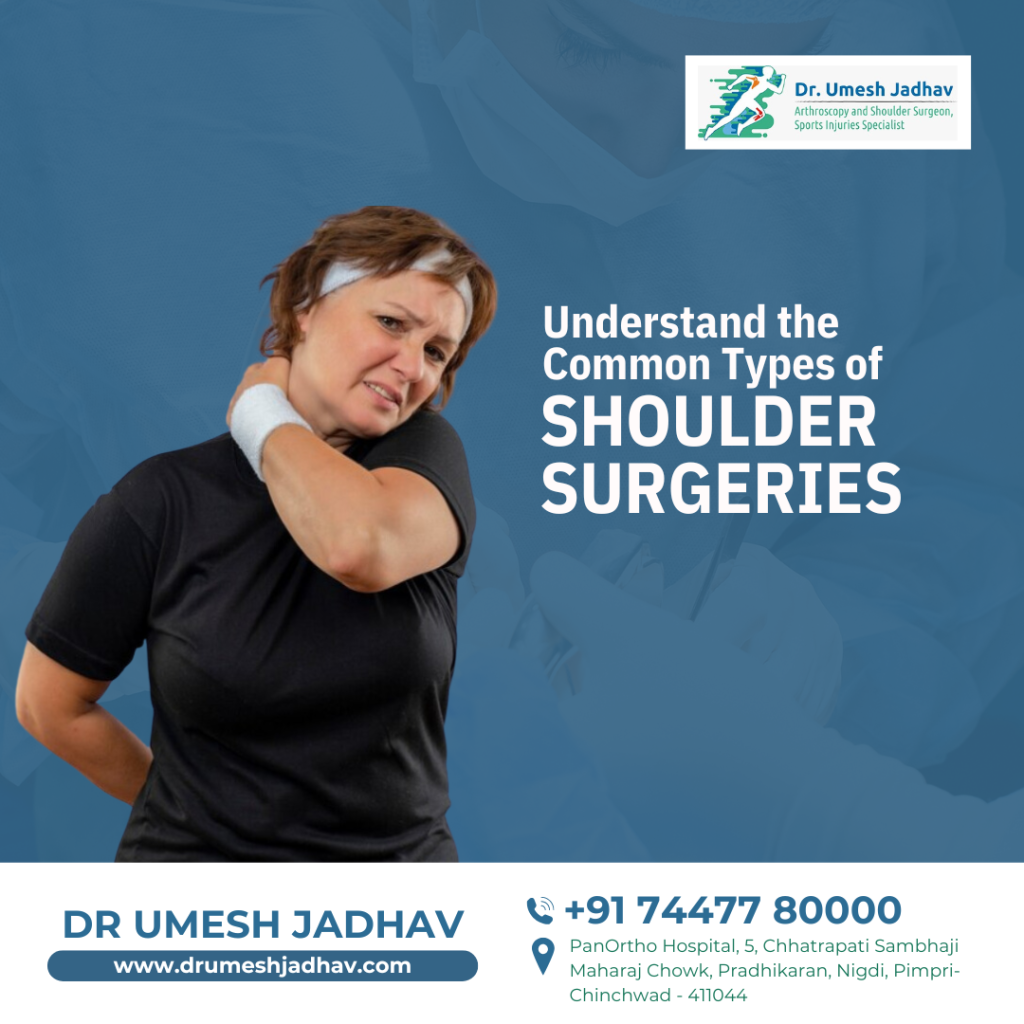Common Types of Shoulder Surgeries
The shoulder is one of the most versatile joints in the human body, allowing for a wide range of movements. However, its flexibility also makes it prone to injuries and wear over time. When shoulder pain or dysfunction persists despite non-surgical treatments, surgery may become the best solution. In this guide, we’ll delve into the common types of shoulder surgeries, what you can expect during recovery and when to consult Shoulder Specialist.
Why Shoulder Surgeries Are Performed
Shoulder surgeries are typically recommended for individuals with:
- Chronic pain or limited mobility unresponsive to therapy or medication.
- Structural damage from acute injuries, like fractures or dislocations.
- Degenerative conditions such as arthritis.
- Persistent instability or recurring dislocations.
Understanding Shoulder Injuries
Several injuries and conditions can necessitate surgery:
- Rotator Cuff Tears: Damage to the tendons that hold the shoulder joint in place.
- Shoulder Instability: Chronic dislocations from sports or trauma.
- Arthritis: Severe joint damage causing pain and stiffness.
- Labral Tears: Tears in the cartilage around the shoulder socket.
- Fractures: Broken bones in the shoulder, like the humerus or clavicle.
Common Types of Shoulder Surgeries
- What It Treats: Torn tendons in the rotator cuff.
- Procedure: Often done arthroscopically, surgeons reattach torn tendons to the bone using sutures and anchors.
- Recovery: 4-6 months with physical therapy to restore strength and flexibility.
2. Total Shoulder Replacement (Arthroplasty)
- What It Treats: Advanced arthritis or severe joint damage.
- Procedure: The damaged joint is replaced with metal and plastic components.
- Recovery: Significant improvements in 3-6 months, but full recovery can take up to a year.
3. Reverse Shoulder Replacement
- What It Treats: Severe arthritis combined with rotator cuff damage.
- Procedure: Reverses the ball-and-socket structure, allowing the deltoid muscle to compensate for the damaged rotator cuff.
- Recovery: Similar to total shoulder replacement, with gradual return to activity.
4. Labral Repair (SLAP or Bankart Repair)
- What It Treats: Tears in the labrum, the cartilage that cushions the shoulder joint.
- Procedure: Arthroscopic surgery to repair or reshape the labrum using sutures.
- Recovery: 3-4 months with a focus on strengthening the shoulder.
5. Shoulder Stabilization Surgery
- What It Treats: Chronic shoulder dislocations and instability.
- Procedure: Surgeons tighten or repair the ligaments and capsule to stabilize the joint.
- Recovery: About 6 months, with gradual return to activities.
6. Fracture Repair
- What It Treats: Broken bones in the shoulder, such as the clavicle or humerus.
- Procedure: Surgeons use metal plates, screws, or rods to secure the bone.
- Recovery: 3-6 months depending on the complexity of the fracture.
The Recovery Process
Recovery times vary based on the type of surgery, age, and overall health. Here’s a general outline of what to expect:
- Post-Surgery Care:
- You may need a sling for several weeks to immobilize the shoulder.
- Pain management through prescribed medications or ice packs.
- Physical Therapy:
- Critical for regaining strength and mobility.
- Begins within weeks and continues for months.
- Gradual Return to Activities:
- Light activities can resume after 3-6 weeks.
- Full recovery for active sports or heavy lifting may take up to a year.
Tips for a Successful Recovery
- Follow Medical Advice: Adhere to your surgeon’s instructions regarding physical activity and therapy.
- Commit to Physical Therapy: Regular sessions will accelerate healing and prevent stiffness.
- Maintain a Healthy Lifestyle: Proper nutrition and hydration aid tissue repair.
- Be Patient: Recovery takes time, and rushing it can lead to setbacks.
When to Consult Shoulder Specialist:
Shoulder surgeries have revolutionized the treatment of shoulder injuries and conditions, offering improved mobility, reduced pain, and enhanced quality of life. Whether it’s a minimally invasive rotator cuff repair or a complex shoulder replacement, these procedures can restore your ability to live and move comfortably.
If you’re experiencing persistent shoulder pain, limited motion, or discomfort in daily activities, consult Dr. Umesh Jadhav, a shoulder specialist in Nigdi, PCMC, provide best treatment for shoulder pain. With over 24 years of experience, he treats conditions like rotator cuff injuries, frozen shoulder, and dislocations. Dr. Jadhav offers advanced treatments, including shoulder replacement and arthroscopy. You can visit him at PanOrtho Hospital, Nigdi, or schedule an appointment today!
Empower yourself with the knowledge to make informed decisions—your shoulders will thank you!

